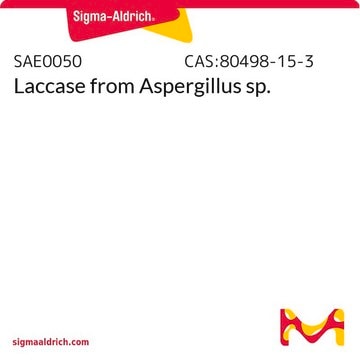L2157
Laccase from Rhus vernicifera
crude acetone powder, ≥50 units/mg solid
Synonym(s):
Benzenediol:oxygen oxidoreductase
About This Item
Recommended Products
form
crude acetone powder
Quality Level
specific activity
≥50 units/mg solid
greener alternative product characteristics
Waste Prevention
Design for Energy Efficiency
Learn more about the Principles of Green Chemistry.
sustainability
Greener Alternative Product
greener alternative category
storage temp.
−20°C
InChI
1S/C9H13NO/c1-4-10-7(2)5-9(6-11)8(10)3/h5-6H,4H2,1-3H3
InChI key
NWDZDFOKSUDVJV-UHFFFAOYSA-N
General description
Unit Definition
Signal Word
Danger
Hazard Statements
Precautionary Statements
Hazard Classifications
Resp. Sens. 1
Storage Class Code
11 - Combustible Solids
WGK
WGK 1
Flash Point(F)
Not applicable
Flash Point(C)
Not applicable
Personal Protective Equipment
Certificates of Analysis (COA)
Search for Certificates of Analysis (COA) by entering the products Lot/Batch Number. Lot and Batch Numbers can be found on a product’s label following the words ‘Lot’ or ‘Batch’.
Already Own This Product?
Find documentation for the products that you have recently purchased in the Document Library.
Customers Also Viewed
Protocols
Laccase, a biocatalyst, oxidizes aromatic compounds with molecular oxygen reduction, making it useful in various applications.
Laccase, a biocatalyst, oxidizes aromatic compounds with molecular oxygen reduction, making it useful in various applications.
Laccase, a biocatalyst, oxidizes aromatic compounds with molecular oxygen reduction, making it useful in various applications.
Laccase, a biocatalyst, oxidizes aromatic compounds with molecular oxygen reduction, making it useful in various applications.
Our team of scientists has experience in all areas of research including Life Science, Material Science, Chemical Synthesis, Chromatography, Analytical and many others.
Contact Technical Service











